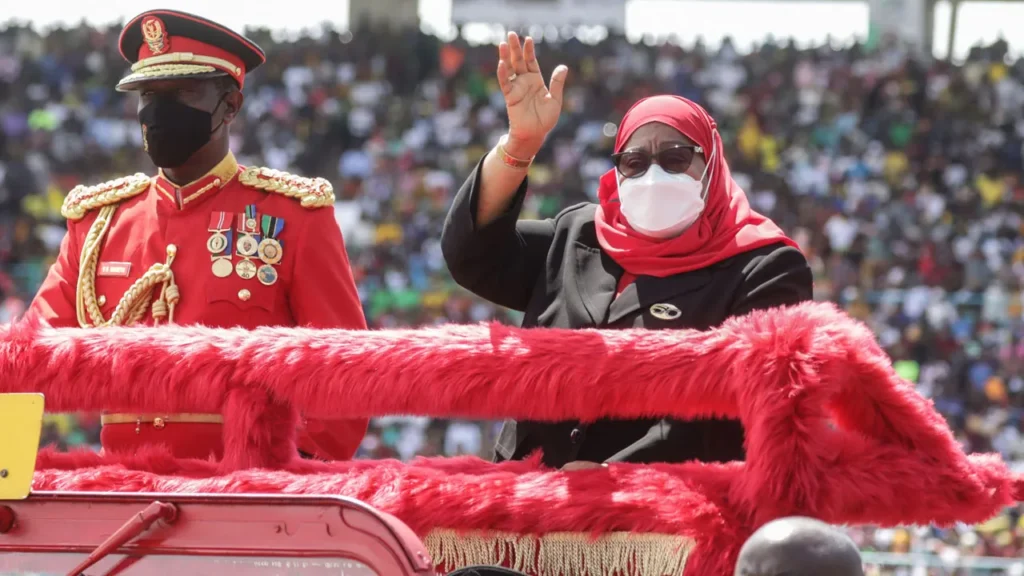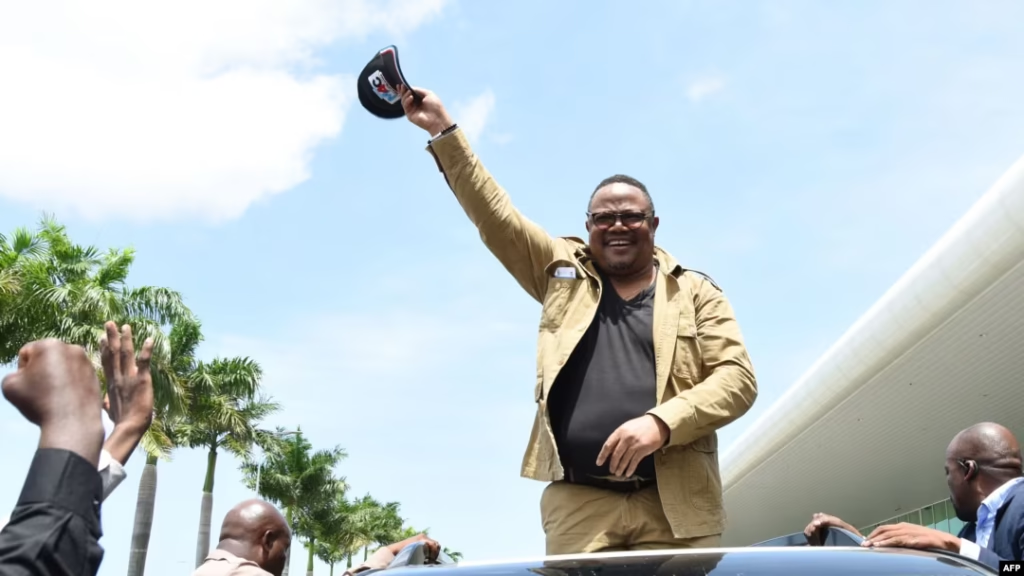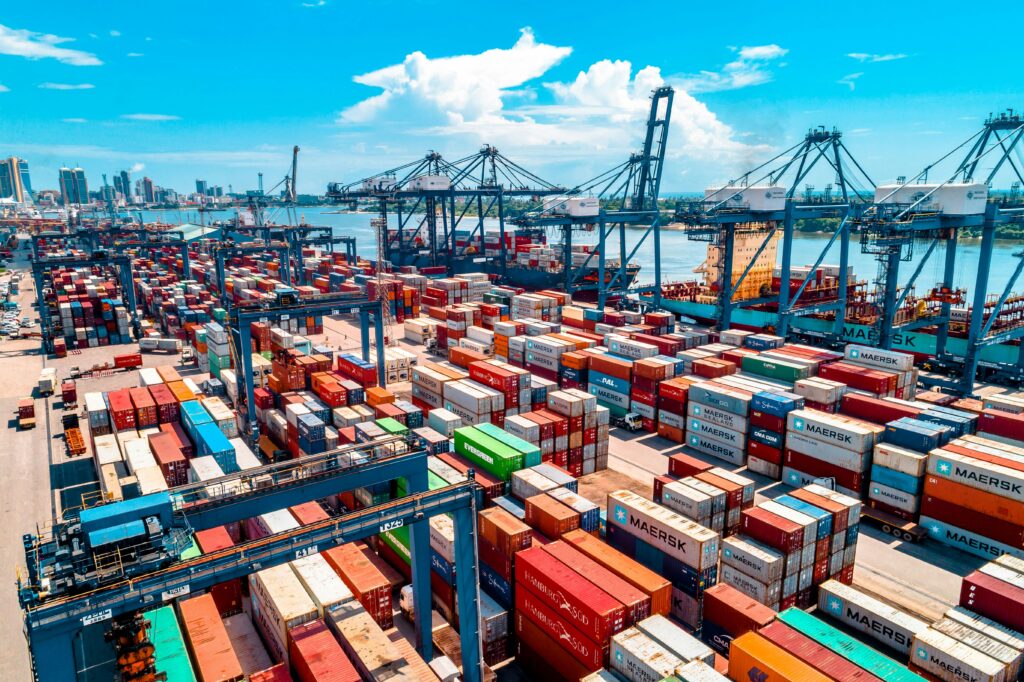In 2021, Samia Suluhu Hassan rose to the highest office of Tanzania when she was elected president of the East African nation.
She became the first female president after the passing of the late President John Magufuli, who had been regarded as a populist leader.
President Hassan, at the start of her administration, offered a stark contrast to her predecessor.
She reopened shuttered newspapers, met with opposition figures, and even acknowledged the COVID-19 pandemic after Magufuli had denied its existence.
She even scrapped the country’s Independence Day celebrations and redirected the funds for social initiatives.

Many saw her as a reformist with the citizenry calling her “Mama Samia”.
But four years later, as the country heads toward a critical general election in October, things have taken a dark turn.
There have been reports of media suppression and surveillance of civil society organizations, with critics saying the country appears to be slipping back to its days of authoritarianism.
Opposition Political Leaders Under Attack
Since 2024, the ruling party—Chama Cha Mapinduzi (CCM)—has moved to tighten its grip on power.
Tanzania’s opposition party, Chadema, has been held under scrutiny as the country’s elections draw closer.
At a recent political rally, Tanzanian police arrested Tundu Lissu, the leader of the party, as he finished addressing a public meeting.
He was later charged with treason.
Tanzania’s electoral commission, the Independent National Elections Commission (INEC), later barred his party from contesting presidential and parliamentary elections later this year.
Other members of the opposition have also faced brutal attacks.

Ali Mohamed Kibao, a member of the secretariat of Chadema, was found dead in September 2024, after two armed men forced him off a bus heading from Dar-es-Salaam to the northeastern port city of Tanga.
Initial investigations found out that he was beaten and doused with acid.
President Samia condemned the act and called for an investigation into the murder.
“I have ordered the investigation agencies to bring me detailed information about this terrible incident and others like this as soon as possible,” she said in a post on X.
Suppression of Media
Under Tanzania’s current regime, journalists and bloggers have also been targeted.
The country’s 2015 Cybercrimes Act is routinely used to detain them, as well as suspend media outlets for “threatening national unity.”
In October 2024, three of Tanzania’s leading newspapers were banned from publishing their online editions after they ran an animation deemed critical of the President.
The papers had their online licenses suspended for 30 days over the viral animated clip, which has since been removed.
In July 2024, a Tanzanian portrait artist was sentenced to two years in prison with a fine of $2000, after being accused of burning a photo of the President on social media.
The arrest sparked legal controversy, with lawyers stating that no law was broken in burning the picture.
Progress of Tanzania
On 28th October, 2025, Tanzania will hold its general elections. The winner will wield control over the judiciary, security forces, and electoral commission.
After taking office in 2021, President Hassan built a solid base of trusted party insiders with the help of former president Jakaya Kikwete.
She immediately sacked Magufuli loyalists and brought back trusted party leaders.
These moves have won her support within her party and among the broader public.
Since her takeover, the Tanzanian economy has been steadily growing.

Bolstered by strong tourism and infrastructural development, the country’s GDP growth expanded from an estimated 5.3–5.6% in 2023–2024 to an expected 6.0% in 2025.
Also elections draw near, the administration has started delivering messages of making positive change.
Muhemsi, a member of the Tanzania Socialist Forum, says the current administration is investing in influencers and state media to craft an image of unity and progress.
“They’re building a parallel reality,” he said. “They want people to see calm and development. Meanwhile, the underprivileged majority are sidelined.”
Current State of Affairs
According to Freedom House, an American organization devoted to the support and defense of democracy around the world, Tanzania’s “Freedom Score” is currently 35/100.
The score indicates that the country is “Not Free”.
According to the organisation, Tanzania’s score reflects the action of authorities who altered the voter registrations of ethnic Maasai citizens as part of a repressive campaign to expel their communities from a planned game reserve.

On June 3rd, 2025, Mo Ibrahim, the Sudanese-British tycoon and philanthropist, made a direct appeal to Presidents Hassan and Yoweri Museveni of Uganda to stop the violent crackdown on their critics.
He expressed concern over the prosecution of Tanzania’s opposition leaders and argued for peace and security in the region.
“I ask President Samia please, be a little bit gentle with the opposition. It is not nice to see what is happening to some of the opposition leaders there,” he said.
As elections draw nearer, more crackdowns on bloggers and journalists continue.
On June 22nd, 2025, Tanzania police officials arrested two local YouTubers, Jackson Kabalo, 32, and Joseph Mrindoko, 37, in the northern town of Arusha, for “improper use of social media.”
The YouTubers posted political talk shows on their Wachokonozi channel, where they discussed topics including the national debt, accountability, democracy, and governance.
As Tanzania’s economy steadily grows and receives help from the international community, including the IMF, will the issues of crackdowns on dissent play a factor when Tanzanians go to the polls in October?
She may have been seen as a reformist, but President Hassan’s rule has not been as open as many would have liked.
Given the government’s recent actions of quashing criticisms of her administration, it would not be surprising if President Hassan gets another mandate after the October elections.





